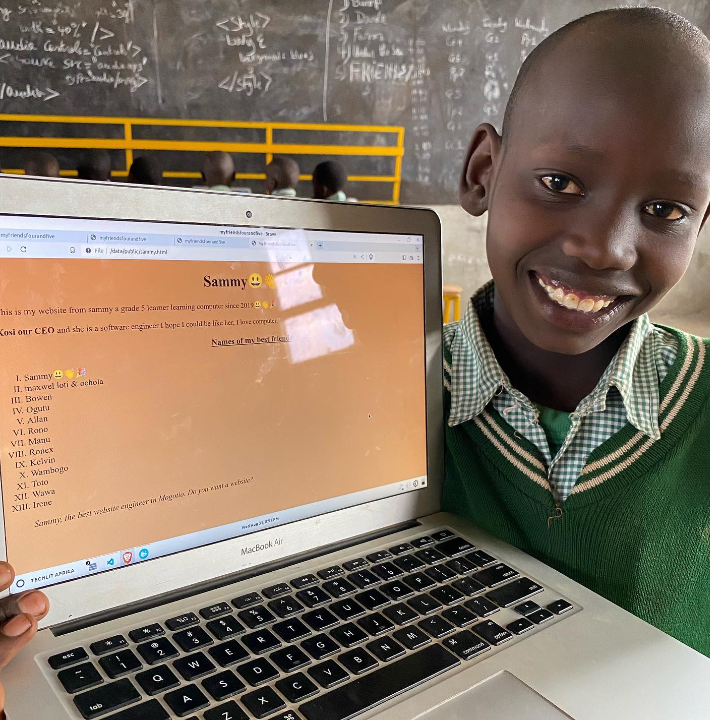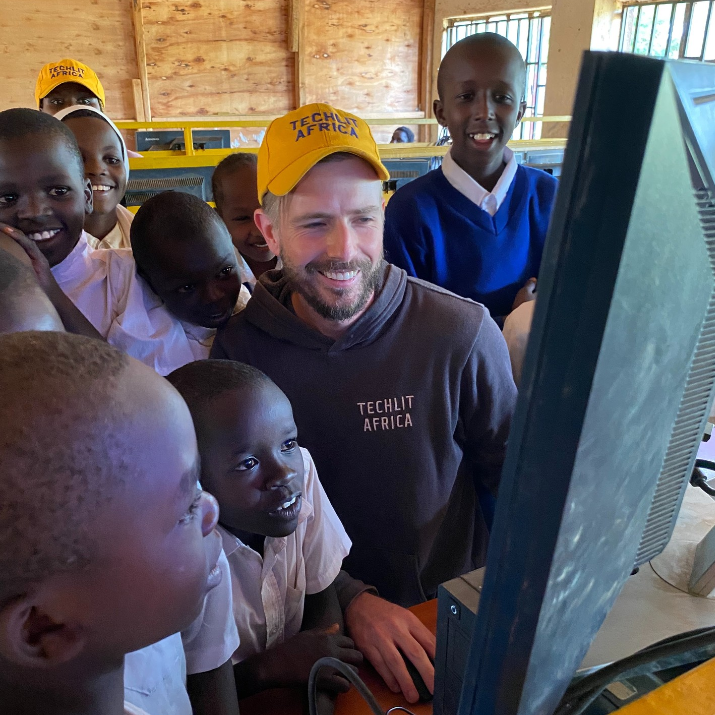Above Photo Credit: nellycheboi_Instagram.com
Nelly Cheboi has a unique mission that she follows with a passion. Her goal is to ensure children in rural Kenya have access to technology and resources to receive an IT education.
Cheboi is the founder of Techlit Africa. This NGO collects older laptops from different companies and institutions to refurbish them. Then she brings this equipment to some of the most remote schools on the African continent so that the children there can start learning basic computer skills.
Almost all the students that receive computers from Techlit Africa would not have used the equipment because of where they live.
“Right now, we have students who don’t even speak Swahili,” said Cheboi, “but they know how to use computers and build websites. The coolest part is that they can still do this work in their own village. They don’t have to go to Nairobi or America.”
Cheboi Earned a Degree in Computer Science and Applied Mathematics in the US
Cheboi was born in Mogotio, Kenya. “I grew up in poverty, often going to school barefoot,” she said. “Most nights, I’d go to bed hungry.” [[1]]
She received a scholarship to attend Augustana in the Quad Cities in 2012, which is where Cheboi says she found her love of computers and technology. “I took an introduction to Java class during my third year of college and fell in love with it.”
After graduating with her undergraduate degrees, she was inspired to start TechLit Africa. TechLit stands for “Technologically Literate.”
“I want students to learn how to leverage the internet for their own purposes,” Cheboi said. “They can start to learn how to make money and build a brand.”
Cheboi’s alma mater donates dozens of computers and monitors to TechLit Africa each year to support the 4,000 students receiving technology education services because of Cheboi’s direct help. The NGO also works with several freight and shipping companies to ensure logistics costs stay low.
“At one point, I was bringing 44 computers,” Cheboi said. “I was paying more for the luggage than the ticket to fly to Kenya.” [[2]]
“If we can start teaching software engineering skills in rural Africa at a young age, then maybe these children can work remotely for tech companies,” said Cheboi.
If those opportunities develop, rural Africa could see a rapid decline in poverty-related issues, especially in its most remote communities and villages.
Cheboi Made the 2022 30 Under 30 List for Social Impact
Cheboi credits her computer literacy for helping to find jobs and make money while doing something she loves. “I know the pain of poverty, and that’s why I feel so passionate about it,” she said.
Her work through TechLit Africa splits her time between her Chicago home and Kenya. “I never forgot what it felt like to have my stomach churning at night because I was hungry.” [[3]]
The changes she has made to the IT educational infrastructure in rural Kenya have helped her become a Top 10 CNN Hero in 2022, earning her a $10,000 prize. The CNN Hero of the Year receives an additional $100,000 to support their cause.
Honorees for the CNN Heroes receive a grant, organizational support, and capacity-building assistance through the Elevate Prize Foundation. This non-profit amplifies the work of impact leaders to drive positive changes for the social good.
Cheboi’s work has also landed her on the 30 Under 30 List for Social Impact produced by Forbes. [[4]]
Although the accolades are nice, it is the lives being changed through her work that matter the most to Cheboi. TechLit Africa has already built ten computer labs and a school in rural Africa in less than six years, and the NGO has its eyes set on creating another 100 of them soon.
The organization has 20 teachers helping students learn IT fundamentals, turning coding into a child’s first language in some cases. TechLit Africa maintains onsite and online ownership of the computers, ensuring that students receive the tech support they need to continue learning. Participating schools are asked to pay a small fee in exchange for having educators onsite throughout the day.
“The world is your oyster when you are educated,” said Cheboi. “By bringing the resources and skills, we are opening up the world to these young children in rural Africa.”
If Cheboi wins the $100,000 prize for being the 2022 CNN Hero of the Year, she plans to establish salary pay and an administrative fund for her NGO. That would let her and her staff do even more. [[5]]
You can follow Cheboi online through TechLit Africa’s Instagram or Twitter accounts.
References:
[[1]] https://www.wqad.com/article/news/local/augustana-alum-nominated-for-cnn-hero-of-the-year-techlit-africa-kenya-students/526-107a32f0-b28e-40cc-afa8-7c5e3de1daa8 [[2]] https://www.cnn.com/2022/07/14/world/education-technology-recycling-kenya-poverty-cnnheroes/index.html [[3]]https://www.ourquadcities.com/news/local-news/augie-alum-in-running-for-cnn-hero-of-the-year/ [[4]] https://www.forbes.com/30-under-30/2022/social-impact [[5]] https://qctimes.com/news/local/education/cnn-hero-of-the-year-nominee-reflects-on-her-journey-and-quad-city-ties/article_a0dfc6cc-7c0b-587a-b485-39dc31cfa7bb.html













